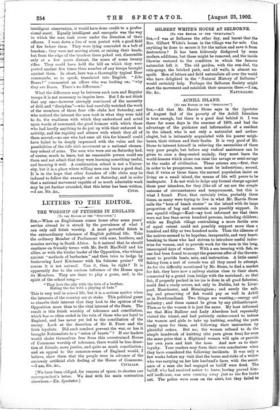LETTERS TO THE EDITOR.
THE WORSHIP OF FETISHES IN ENGLAND.
PTO THE EDITOR OP THE " SPECTATOR."]
Sin,—When an Englishman comes home after some years' service abroad he is struck by the prevalence of what I can only call fetish worship. A most powerful fetish is the extraordinary tolerance of English political life. Take the ordinary Member of Parliament with sons, brothers, and cousins serving in South Africa. Is it natural that he should continue on friendly terms with Mr. Swift MacNeill and his allies or with the titular leader of the Opposition, who whined against " methods of barbarism " and then tries to hedge by beslavering Lord Kitchener with his fulsome praise? Of course it is not natural. Can it, then, be right P It is apparently due to the curious influence of the House upon its Members. They are there to play a game, and, in the spirit of the school song,—
"They love the ally with the love of a brother, Hating the foe with a playing at hate."
This is very well in school life, but it is a serious matter when the interests of the country are at stake. This political game so absorbs their interest that they look to the opinion of the Opposition more than to the vital interest of the State. The result is this fetish worship of tolerance and conciliation, which has so often ended in the ruin of those who are loyal to England, and has never yet led to the conciliation of the enemy. Look at the desertion of Sir B. Frere and the Irish loyalists. Did such conduct prevent the war, or has it brought Nationalists to a " union of hearts " ? If our leaders would shake themselves free from this overstrained House of Commons worship of tolerance, there would be less deser- tion of friends, more justice, and quite as much conciliation; and an appeal to the common-sense of England would, I believe, show them that the people were in advance of the curiously artificial club feeling of the House of Commons.
[We have been obliged, for reasons of space, to shorten our correspondent's letter. We deal with his main contention elsewhere.—En. Spectator.1






































 Previous page
Previous page